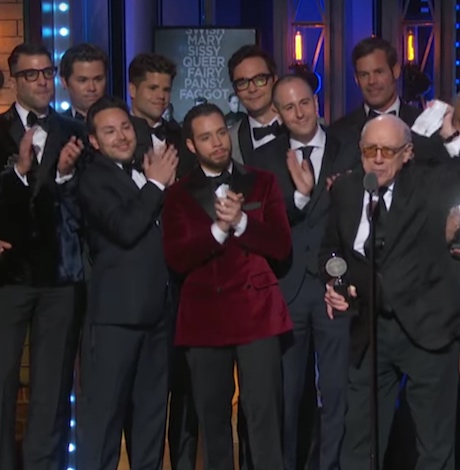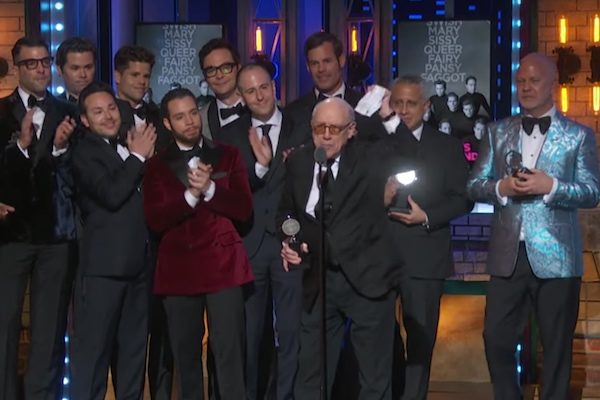Arts & Entertainment
Tony Awards 2019: ‘Boys in the Band,’ ‘The Cher Show’ pick up wins
‘Hadestown’ leads with triumphs for eight categories


“The Boys in the Band” received the award for Best Revival of a Play at the 73rd Annual Tony Awards at Radio City Music Hall on Sunday making 83-year-old playwright Mart Crowley the oldest playwright to win the award.
The play tells the story of a group of gay friends who gather together to celebrate a friend’s birthday in pre-Stonewall New York City. It opened off-Broadway in 1968. For the play’s 50th anniversary, the production was revived in 2018 with co-producer Ryan Murphy and director Joe Mantello.
The openly gay revival cast included Matt Bomer, Jim Parsons, Zachary Quinto, Andrew Rannells, Charlie Carver, Robin de Jesús, Brian Hutchison, Tuc Watkins and Michael Benjamin Washington.
Murphy is also planning a film adaptation for Netflix featuring the Broadway cast.
Crowley dedicated the award to the original cast in his acceptance speech.
“I’d like to dedicate the award to the original cast of nine brave men, who did not listen to their agents when they were told that their careers would be finished if they did this play,” Crowley said. “They did it, and here I am.”
“Hadestown” was the big winner of the evening, which was hosted by James Corden, coming in with eight wins.
Bisexual actress Ali Stoker, also known for her work on “The Glee Project,” won Best Featured Actress in a Musical for portraying Ado Annie in the “Oklahoma!” revival.
Stephanie J. Block won Best Actress in a Musical for playing Cher in “The Cher Show.” Legendary costume designer Bob Mackie and longtime Cher collaborator also won Best Costume Design in a Musical for “The Cher Show.” Cher celebrated the multiple wins with an emotional tweet.
I CANNOT STOP JUMPING, CRYING,LAUGHING,….I FEEL LIKE I WON AN AWARD‼️
— Cher (@cher) June 10, 2019
NOT EVEN SURE IF I CAN USE EMOJIS.
STEPHANIE,BESIDES ME…YOU
ARE THE“ BEST ME”?
BOB I LOVED YOU THE MOMENT I SAW YOU❤️
BEST ACTRESS IN MUSICAL =
STEPHANIE J BLOCK
BEST COSTUME DESIGN
BOB MACKIE pic.twitter.com/Lsha8FhKQX
Gay winners continued to dominate the night with Robert Horn winning Best Book of a Musical for “Tootsie,” Sergio Trujillo winning Best Choreography for The Temptations musical “Ain’t Too Proud” and André DeShields winning Best Featured Actor in a Musical for Broadway hit “Hadestown.”
The Tonys included some starring looks including Billy Porter who rocked the rainbow-backdropped red carpet, which honored World Pride, with a Celestino Couture created from the velvet curtains of “Kinky Boots.” Porter won a Tony Award for starring in the musical in 2013. The outfit is reportedly meant to resemble women’s reproductive organs in a stand for abortion rights.
“The Prom” cast also performed and included the kiss that made history at the Macy’s Thanksgiving Day Parade for being the first same-sex kiss to air on the televised parade.
Check out the list of winners below.
Best Play
“Choir Boy”
“Gary: A Sequel to Titus Andronicus”
“Ink”
“The Ferryman”
“What the Constitution Means to Me”
Best Musical
“Ain’t Too Proud”
“Beetlejuice”
“Hadestown”
“The Prom”
“Tootsie”
Best Revival of a Play
“All My Sons”
“Burn This”
“The Boys in the Band”
“The Waverly Gallery”
“Torch Song”
Best Revival of a Musical
Kiss Me, Kate
“Oklahoma!”
Best Book of a Musical
“Ain’t Too Proud” by Dominique Morisseau
“Beetlejuice” by Scott Brown and Anthony King
“Hadestown” by Anaïs Mitchell
“The Prom” by Bob Martin and Chad Beguelin
“Tootsie” by Robert Horn
Best Original Score (Music and/or Lyrics) Written for the Theatre
“Be More Chill” by Joe Iconis
“Beetlejuice” by Eddie Perfect
“Hadestown” by Anaïs Mitchell
“The Prom” by Matthew Sklar and Chad Beguelin
“To Kill a Mockingbird” by Adam Guettel
“Tootsie” by David Yazbek
Best Performance by an Actor in a Leading Role in a Play
Paddy Considine, “The Ferryman”
Bryan Cranston, “Network”
Jeff Daniels, “To Kill a Mockingbird”
Adam Driver, “Burn This”
Jeremy Pope, “Choir Boy”
Best Performance by an Actress in a Leading Role in a Play
Annette Bening, “All My Sons”
Laura Donnelly, “The Ferryman”
Elaine May, “The Waverly Gallery”
Laurie Metcalf, “Hillary and Clinton”
Janet McTeer, “Bernhardt/Hamlet”
Heidi Schreck, “What the Constitution Means to Me”
Best Performance by an Actor in a Leading Role in a Musical
Brooks Ashmanskas, “The Prom”
Derrick Baskin, “Ain’t Too Proud”
Alex Brightman, “Beetlejuice”
Damon Daunno, “Oklahoma!”
Santino Fontana, “Tootsie”
Best Performance by an Actress in a Leading Role in a Musical
Stephanie J. Block, “The Cher Show”
Caitlin Kinnunen, “The Prom”
Beth Leavel, “The Prom”
Eva Noblezada, “Hadestown”
Kelli O’Hara, “Kiss Me, Kate”
Best Performance by an Actor in a Featured Role in a Play
Bertie Carvel, “Ink”
Robin De Jesús, “The Boys in the Band”
Gideon Glick, “To Kill a Mockingbird”
Brandon Uranowitz, “Burn This”
Benjamin Walker, “All My Sons”
Best Performance by an Actress in a Featured Role in a Play
Fionnula Flanagan, “The Ferryman”
Celia Keenan-Bolger, “To Kill a Mockingbird”
Kristine Nielsen, “Gary: A Sequel to Titus Andronicus”
Julie White, “Gary: A Sequel to Titus Andronicus”
Ruth Wilson, “King Lear”
Best Performance by an Actor in a Featured Role in a Musical
André De Shields, “Hadestown”
Andy Grotelueschen, “Tootsie”
Patrick Page, “Hadestown”
Jeremy Pope, “Ain’t Too Proud”
Ephraim Sykes, “Ain’t Too Proud”
Best Performance by an Actress in a Featured Role in a Musical
Lilli Cooper, “Tootsie”
Amber Gray, “Hadestown”
Sarah Stiles, “Tootsie”
Ali Stroker, “Oklahoma!”
Mary Testa, “Oklahoma!”
Best Scenic Design of a Play
Miriam Buether, “To Kill a Mockingbird”
Bunny Christie, “Ink”
Rob Howell, “The Ferryman”
Santo Loquasto, “Gary: A Sequel to Titus Andronicus”
Jan Versweyveld, “Network”
Best Scenic Design of a Musical
Robert Brill and Peter Nigrini, “Ain’t Too Proud”
Peter England, “King Kong”
Rachel Hauck, “Hadestown”
Laura Jellinek, “Oklahoma!”
David Korins, “Beetlejuice”
Best Costume Design of a Play
Rob Howell, “The Ferryman”
Toni-Leslie James, “Bernhardt/Hamlet”
Clint Ramos, “Torch Song”
Ann Roth, “Gary: A Sequel to Titus Andronicus”
Ann Roth, “To Kill a Mockingbird”
Best Costume Design of a Musical
Michael Krass, “Hadestown”
William Ivey Long, “Beetlejuice”
William Ivey Long, “Tootsie”
Bob Mackie, “The Cher Show”
Paul Tazewell, “Ain’t Too Proud”
Best Lighting Design of a Play
Neil Austin, “Ink”
Jules Fisher + Peggy Eisenhauer, “Gary: A Sequel to Titus Andronicus”
Peter Mumford, “The Ferryman”
Jennifer Tipton, “To Kill a Mockingbird”
Jan Versweyveld and Tal Yarden, “Network”
Best Lighting Design of a Musical
Kevin Adams, “The Cher Show”
Howell Binkley, “Ain’t Too Proud”
Bradley King, “Hadestown”
Peter Mumford, “King Kong”
Kenneth Posner and Peter Nigrini, “Beetlejuice”
Best Sound Design of a Play
Adam Cork, “Ink”
Scott Lehrer, “To Kill a Mockingbird”
Fitz Patton, “Choir Boy”
Nick Powell, “The Ferryman”
Eric Sleichim, “Network”
Best Sound Design of a Musical
Peter Hylenski, “Beetlejuice”
Peter Hylenski, “King Kong”
Steve Canyon Kennedy, “Ain’t Too Proud”
Drew Levy, “Oklahoma!”
Nevin Steinberg and Jessica Paz, “Hadestown”
Best Direction of a Play
Rupert Goold, “Ink”
Sam Mendes, “The Ferryman”
Bartlett Sher, “To Kill a Mockingbird”
Ivo van Hove, “Network”
George C. Wolfe, “Gary: A Sequel to Titus Andronicus”
Best Direction of a Musical
Rachel Chavkin, “Hadestown”
Scott Ellis, “Tootsie”
Daniel Fish, “Oklahoma!”
Des McAnuff, “Ain’t Too Proud”
Casey Nicholaw, “The Prom”
Best Choreography
Camille A. Brown, “Choir Boy”
Warren Carlyle, “Kiss Me, Kate”
Denis Jones, “Tootsie”
David Neumann, “Hadestown”
Sergio Trujillo, “Ain’t Too Proud”
Best Orchestrations
Michael Chorney and Todd Sickafoose, “Hadestown”
Simon Hale, “Tootsie”
Larry Hochman, “Kiss Me, Kate”
Daniel Kluger, “Oklahoma!”
Harold Wheeler, “Ain’t Too Proud”
Books
Love or fear flying you’ll devour ‘Why Fly’
New book chronicles a lifetime obsession with aircraft

‘Why Fly’
By Caroline Paul
c. 2026, Bloomsbury
$27.99/256 pages
Tray table folded up.
Check. Your seat is in the upright position, the airflow above your head is just the way you like it, and you’re ready to go. The flight crew is making final preparations. The lights are off and the plane is backing up. All you need now is “Why Fly” by Caroline Paul, and buckle up.

When she was very young, Paul was “obsessed” with tales of adventure, devouring accounts written by men of their derring-do. The only female adventure-seeker she knew about then was Amelia Earhart; later, she learned of other adventuresome women, including aviatrix Bessie Coleman, and Paul was transfixed.
Time passed; Paul grew up to create a life of adventure all her own.
Then, the year her marriage started to fracture, she switched her obsession from general exploits to flight.
Specifically, Paul loves experimental aircraft, some of which, like her “trike,” can be made from a kit at home. Others, like Woodstock, her beloved yellow gyrocopter, are major purchases that operate under different FAA rules. All flying has rules, she says, even if it seems like it should be as freewheeling as the birds it mimics.
She loves the pre-flight checklist, which is pure anticipation as well as a series of safety measures; if only a relationship had the same ritual. Paul loves her hangar, as a place of comfort and for flight in all senses of the word. She enjoys thinking about historic tales of flying, going back before the Wright Brothers, and including a man who went aloft on a lawn chair via helium-filled weather balloons.
The mere idea that she can fly any time is like a gift to Paul.
She knows a lot of people are terrified of flying, but it’s near totally safe: generally, there’s a one in almost 14 million chance of perishing in a commercial airline disaster – although, to Paul’s embarrassment and her dismay, it’s possible that both the smallest planes and the grandest loves might crash.
If you’re a fan of flying, you know what to do here. If you fear it, pry your fingernails off the armrests, take a deep breath, and head to the shelves. “Why Fly” might help you change your mind.
It’s not just that author Caroline Paul enjoys being airborne, and she tells you. It’s not that she’s honest in her explanations of being in love and being aloft. It’s the meditative aura you’ll get as you’re reading this book that makes it so appealing, despite the sometimes technical information that may flummox you between the Zen-ness. It’s not overwhelming; it mixes well with the history Paul includes, biographies, the science, heartbreak, and exciting tales of adventure and risk, but it’s there. Readers and romantics who love the outdoors, can’t resist a good mountain, and crave activity won’t mind it, though, not at all.
If you own a plane – or want to – you’ll want this book, too. It’s a great waiting-at-the-airport tale, or a tuck-in-your-suitcase-for-later read. Find “Why Fly” and you’ll see that it’s an upright kind of book.
The Blade may receive commissions from qualifying purchases made via this post.
Theater
Out actor Kevin Cahoon on starring role in ‘Chez Joey’
Arena production adapted from Broadway classic ‘Pal Joey’

‘Chez Joey’
Through March 15
Arena Stage
1101 Sixth St., S.W.
Tickets start at $93
Arenastage.org
As Melvin Snyder in the new musical “Chez Joey,” out actor Kevin Cahoon plays a showbiz society columnist who goes by the name Mrs. Knickerbocker. He functions as a sort of liaison between café society and Chicago’s Black jazz scene circa 1940s. It’s a fun part replete with varied insights, music, and dance.
“Chez Joey” is adapted from the Broadway classic “Pal Joey” by Richard Rodgers and Lorenz Hart. It’s inspired by John O’Hara’s stories based on the exploits of a small-time nightclub singer published in The New Yorker.
A warm and humorous man, Cahoon loves his work. At just six, he began his career as a rodeo clown in Houston. He won the Star Search teen division at 13 singing songs like “Some People” from “Gypsy.” He studied theater at New York University and soon after graduating set to work playing sidekicks and comedic roles.
Over the years, Cahoon has played numerous queer parts in stage productions including “Hedwig and the Angry Inch,” “La Cage aux Folles,” “Rocky Horror” as well as Peanut in “Shucked,” and George the keyboardist in “The Wedding Singer,” “a sort of unicorn of its time,” says Cahoon.
Co-directed by Tony Goldwyn and the great Savion Glover, “Chez Joey” is a terrific and fun show filled with loads of talent. Its relevant new book is by Richard Lagravenese.
On a recent Monday off from work, Cahoon shared some thoughts on past and current happenings.
WASHINGTON BLADE: Is there a through line from Kevin, the six-year-old rodeo clown, to who we see now at Arena Stage?
KEVIN CAHOON: Anytime I want to land a joke in a theater piece it goes back to that rodeo clown. It doesn’t matter if it’s Arena’s intimate Kreeger Theatre or the big rodeo at the huge Houston Astrodome.
I was in the middle stadium and there was an announcer — a scene partner really. And we were doing a back and forth in hopes of getting laughs. At that young age I was trying to understand what it takes to get laughs. It’s all about timing. Every line.
BLADE: Originally, your part in “Chez Joey” Melvin was Melba who sings “Zip,” a clever woman reporter’s song. It was sort of a star feature, where they could just pop in a star in the run of “Pal Joey.”
CAHOON: That’s right. And in former versions it was played by Martha Plimpton and before her Elaine Stritch. For “Chez Joey,” we switched gender and storyline.
We attempted to do “Zip” up until two days before we had an audience at Arena. Unexpectedly they cut “Zip” and replaced it with a fun number called “I Like to Recognize the Tune,” a song more connected to the story.
BLADE: Wow. You must be a quick study.
CAHOON: Well, we’re working with a great band.
BLADE: You’ve played a lot of queer parts. Any thoughts on queer representation?
CAHOON: Oh yes, definitely. And I’ve been very lucky that I’ve had the chance to portray these characters and introduce them to the rest of the world. I feel honored.
After originating Edna, the hyena on Broadway in “The Lion King,” I left that to do “Hedwig and the Angry Inch” as standby for John Cameron Mitchell, doing one show a week for him.
Everyone thought I was crazy to leave the biggest musical of our time with a personal contract and getting paid more money that I’d ever made to get $400 a week at the downtown Jane Street Theatre in a dicey neighborhood.
At the time, I really felt like I was with cool kids. I guess I was. And I never regretted it.
BLADE: When you play new parts, do you create new backstories for the role?
CAHOON: Every single time! For Melvin, I suggested a line about chorus boys on Lakeshore Drive.
BLADE: What’s up next for Kevin Cahoon?
CAHOON: I’m about to do the New York Theatre Workshop Gala; I’ve been doing it for nine years in a row. It’s a huge job. I’ll also be producing the “Cats: The Jellicle Ball” opening on Broadway this spring; it’s a queer-centric uptown vogue ball with gay actor André de Shields reprising his role as “Old Deuteronomy.”
BLADE: There’s a huge amount of talent onstage in “Chez Joey.”
CAHOON: There is. I’m sharing a dressing room with Myles Frost who plays Joey. He won accolades for playing Michael Jackson on Broadway. We’ve become great friends. He’s a miracle to watch on stage. And Awa [Sal Secka], a D.C. local, is great. Every night the audience falls head over heels for her. When this show goes to New York, Awa will, no doubt, be a giant star.
BLADE: Do you think “Chez Joey” might be Broadway bound?
CAHOON: I have a good feeling it is. I’ve done shows out of town that have high hopes and pedigree, but don’t necessarily make it. “Chez Joey” is a small production, it’s funny, and audiences seem to love it.

The Capital Pride Alliance held the annual Pride Reveal event at The Schuyler at The Hamilton Hotel on Thursday, Feb. 26. The theme for this year’s Capital Pride was announced: “Exist. Resist. Have the audacity!”
(Washington Blade photos by Michael Key)























-

 Federal Government5 days ago
Federal Government5 days agoTwo very different views of the State of the Union
-

 Virginia5 days ago
Virginia5 days agoVa. activists preparing campaign in support of repealing marriage amendment
-

 Opinions5 days ago
Opinions5 days agoThe global cost of Trump’s foreign aid ideology
-

 Movies4 days ago
Movies4 days agoMoving doc ‘Come See Me’ is more than Oscar worthy




















